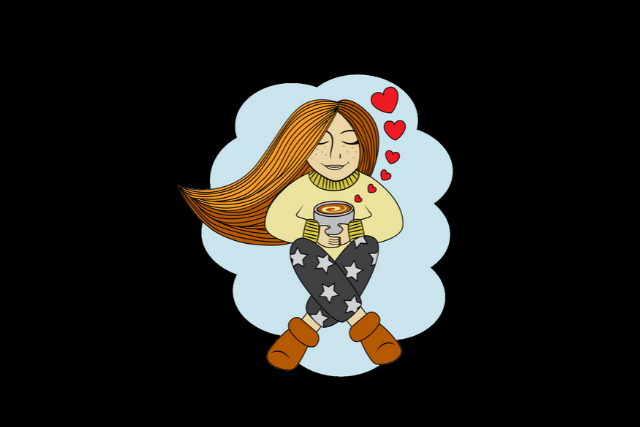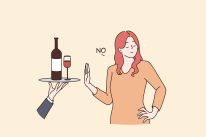
“It’s all about falling in love with yourself and sharing that love with someone who appreciates you, rather than looking for love to compensate for a self-love deficit.” ~Eartha Kitt
I always found the concept of self-love embarrassing and horrifying. Just thinking about it would make me cringe. It felt completely wrong, and I didn’t understand what it was all about. Quite frankly, I felt disgusted by it and thought it was a new-age invention by self-centerd people who wanted to have more opportunities to be selfish.
Sure, I was young then, but I can now also see how that reaction reflected the truth about the absolute absence of self-love in my life.
At that time, I was not aware that my lack of self-love affected many other areas of my life.
I particularly struggled in my romantic relationships even though that was the area I most valued and focused on. There was nothing in the world I wanted more than a loving and fun relationship.
I wanted someone to make me feel loved, safe, and happy. I wanted to have an amazing life with someone else, but I couldn’t see that happening by myself. Every time I experienced difficult feelings or low moods, I felt disappointed, silently angry, and resentful because I blamed my partner for causing my unhappiness.
I blamed them because, in my eyes, they let me down. If they did a better job at being a supportive and loving partner, I would be feeling better, right?
And so, at first, I tried to change and fix my partners. I tried to get them to give me the relationship I didn’t give myself.
Obviously, I didn’t know this then. I didn’t know that there was such a thing as being in a relationship with yourself.
Most people I speak to don’t know this either. It’s not something we usually consider or are taught at school. And so, we live like we don’t matter. We don’t pay ourselves any attention and we try to get from others what we do not give to ourselves: a sense of worth, validation, consideration, and love.
I lived like that for the majority of my life.
I didn’t realize that I was in a relationship with myself. I didn’t know that that was even a thing. I definitely didn’t know that the relationship I have with myself informs the quality of all my other relationships.
And so, I struggled through my relationships and endured experiences I wouldn’t have had if I had loved and valued myself.
I struggled with the pain and desperation of unmet needs but failed to see that I could give myself what I wanted and needed. By being blind to this, I made myself depend on those around me, which usually didn’t end well. Codependency ruled and ruined my relationships.
While recovering from codependency, I had many realizations that paved the way for developing an honest sense of self-worth. The notions of self-love I previously rejected so much now come naturally. They just make sense.
And so I want to share with you some of the realizations I’ve had that helped me improve my relationships, feel good about myself, and fall in love with life, in the hope that you can see how the relationship you have with yourself directly impacts how you relate to others.
Your Sense of Self-Worth Determines Your Relationship Standards
If you don’t like and love yourself, you don’t value yourself, so you’ll have low standards for how you let people treat you. We simply don’t protect and take care of what we don’t hold in high regard.
The way you treat yourself and how you let others treat you shows you how much or little you really value yourself. So notice the standards you set. Notice what you tolerate. This will tell you whether or not you value yourself if you are unsure.
Noticing that this is something you can practice in your relationship. It’s an ongoing exploration that a partner can also help you with by providing feedback on how they see you treat yourself.
If you want to learn how to treat yourself better, think about how you treat something or someone you value and truly appreciate. Then begin to set healthy standards for how you treat yourself and what behaviors you accept from others.
For example, notice when you choose to go without something you want or need, and make a different choice. Find a solution for how you can give it to yourself. Be proactive when it comes to pleasing yourself or supporting yourself.
Or, if someone is talking to you in demeaning and disrespectful ways, remind yourself that this is no longer acceptable because you now protect what you value: you.
Your Level of Self-Care Impacts Your Well-Being
So far, we have established that we take care of what we value. Your self-care is therefore an expression of what you believe about yourself.
I am quite blunt about the absence of self-care and call it self-neglect.
If you fail to take care of yourself, you give your partner a neglected version of yourself, which certainly impacts your relationship negatively.
It may also put pressure on your partner to take on your responsibilities. Their rescuing tendencies may be activated, and you’ll co-create an unhealthy victim-rescuer or parent-child dynamic. You may feel too depleted to go out, take part in activities, or have fun.
It is absolutely vital for you to take care of yourself. It’s not only for your benefit, so you’re in a position to actually enjoy your life and being in a relationship, but also benefits everyone around you.
Remember this the next time the “self-care is selfish” thought swirls around your head. It’s completely untrue. You deserve your own time, attention, and care. It’s healthy and it’s necessary.
Others Cannot Fill the Void You Create
When we neglect ourselves, we deprive ourselves of what we need: attention, consideration, care, support, reassurance, connection, encouragement, and love.
We then tend to look toward others to provide it for us. We mistakenly believe that the pain we experience is something only they can soothe or heal.
I guess that’s true if we don’t do it for ourselves. The problem is that others cannot do it for us. They cannot fill the void we create by depriving ourselves of self-care.
Other people can support us and boost us from time to time, but they simply cannot do it for us because their efforts meet a void and simply disappear into insignificance.
When we don’t like ourselves, we don’t understand why others like us. When we don’t like how we look and someone compliments us, we don’t believe them. We think they’re lying to us or they are just being nice.
When we don’t love ourselves, we cannot receive anyone else’s love because we don’t trust it. We don’t believe it. It doesn’t match with what we believe about ourselves, and so our brains reject it. It doesn’t feel safe and all of a sudden, our relationship becomes fear-based.
Neglecting ourselves and expecting our partner to do our job for us is the biggest relationship killer. It sets us up for endless disappointment and feeling unloved because another person does not have access to what you have access to—your inner self—and therefore cannot meet your specific needs in the way you need them to be met.
You Are Not Emotionally Safe for Yourself
All relationships require emotional safety. It allows us to express ourselves honestly, openly, and authentically. We know that our partner gives us space to simply be and express who we are in that moment and to respond lovingly.
When we don’t value ourselves, we don’t respond to ourselves. We deny what we feel, want, and need. We make ourselves not matter in our own lives. We may put others’ needs above our own and often, we may not even know what we want or need.
This is a sign that we lack emotional safety within our relationship with ourselves.
It is not safe for me to tell myself that I want something when I am being ignored, judged, or shamed for it. It is not safe for me to be vulnerable and open up to myself when I am being told to go away, avoid my feelings and desires, or that someone else is more important than me.
The problem is that by not being emotionally safe to myself, I cannot be emotionally available to others because I simply cannot go there. I cannot be honest and vulnerable. I cannot open up to another person if I don’t open up to myself. I cannot share what I am too afraid to see.
And so, not being emotionally safe and available to myself means that I put a limit on how deeply I can connect with my partner, which will negatively affect the level of intimacy we can develop and experience. Intimacy needs openness and emotional connection and cannot exist without emotional safety.
I Am Co-Creator of My Relationships
Relationships don’t just randomly happen to us. We co-create them. We are always in a relationship—even if it’s the one we have with ourselves.
And it’s the one we have with ourselves that informs all others. I get that we are all conditioned to look for “The One” and to believe that there is a person out there that will heal us and make everything better for us.
So it can feel like a huge loss to be told that you need to learn to look after yourself to have the relationship you want. It can feel like an impossible task, especially when you believe that you must learn it all before you’re in a relationship.
I believe that we learn as we go along. We learn through and from our experiences and adapt our behaviors and decisions accordingly.
I don’t advocate relational deprivation to end codependency or to improve the relationship you have with yourself. I support every individual’s choice and understand why recovery requires many to be and stay single. It is quite possibly the least complicated way to start over.
It is also possible to learn to like and love yourself within a relationship and have that relationship change and improve as a result of your transformation because, after all, you co-create it.
The relationship you have with yourself sets the tone for all the other relationships you have in your life.
The good thing is that you are in charge of that now. You have the power and you get to choose how you treat yourself.
Will you continue to deprive, neglect, or abuse yourself? Or are you willing to truly change your life by changing how you relate to yourself?
The choice is yours and yours alone.
Say “yes” to love—say “yes” to self-love because it does change everything.
About Marlena Tillhon
Marlena is a highly experienced psychotherapist and success coach specialising in healing inner trauma and breaking unhealthy patterns that stop her ambitious clients from having the success they know they can have in their lives, relationships, and careers. You can find her on Instagram or Facebook and receive her free training and gifts on her website.













 Though I run this site, it is not mine. It's ours. It's not about me. It's about us. Your stories and your wisdom are just as meaningful as mine.
Though I run this site, it is not mine. It's ours. It's not about me. It's about us. Your stories and your wisdom are just as meaningful as mine.
It’s okay to love myself!!! I’m so happy when I think about myself, I used to feel guilty though, because I think I’m pretty, I’m a sweetheart, I’m so wonderful!!! I’m not a bad person though I just have a lot of adoration and love for myself. It’s like I’m ummm, enamored of me but I’m happy so I think there’s nothing wrong with loving myself so much, nothing!!!!!
I love spreading all that love and positivity around too, but I do it for myself first, I deeply love me!!! Always!!! I don’t know if it’s good that I’m constantly thinking about me soooo much, I love looking myself at the mirror, I’m enamored of my own personality, but I’m not selfish I’m really not! I just have a very very high self esteem and that’s okay!! It’s okay it’s okay it’s okay!!!!
I adore me.
Hi Marlena, although I am not in a place of relationship nor even want to have one. But reading it kinda struck some thoughts for myself, made me questioned a simple question.
Especially this part which kinda affects the 2 points that you highlighted about affecting well-being and expectations of others to fill a missing void. I simply realised that, wow Marlena, you know I am really putting very low value of myself. Probably also because of what that had happened.
Nevertheless, I will try to re-read again to bring more sense to me. Thank you for sharing your thoughts with us.
Beautiful!!! Wonderful points to ponder!! GREAT post, thank you for sharing! 🙂
Self-love seems to be the hardest part for me. It sucks. Great article. Thank you
And you are not alone in it. Many struggle like that because we have this a peculiar tendency — we take a great idea, make a subtle change that turns it from something helpful into something just as dangerous. Then, staying completely blind to what we have done, we, nonetheless get an irresistible urge to spread the love… so we start sending the evil twin everywhere.